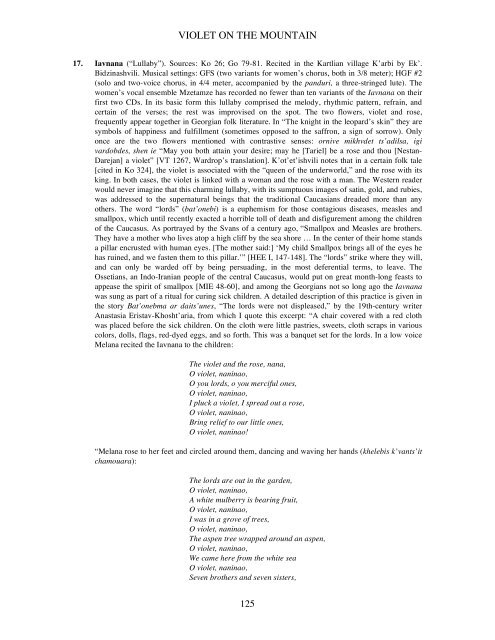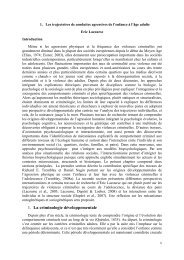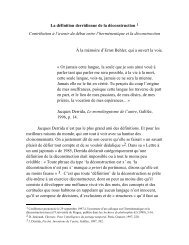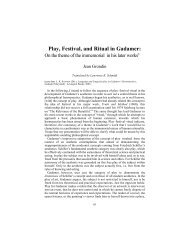You also want an ePaper? Increase the reach of your titles
YUMPU automatically turns print PDFs into web optimized ePapers that Google loves.
VIOLET ON THE MOUNTAIN<br />
17. Iavnana (“Lullaby”). Sources: Ko 26; Go 79-81. Recited in the Kartlian village K’arbi by Ek’.<br />
Bidzinashvili. Musical settings: GFS (two variants for women’s chorus, both in 3/8 meter); HGF #2<br />
(solo and two-voice chorus, in 4/4 meter, accompanied by the panduri, a three-stringed lute). The<br />
women’s vocal ensemble Mzetamze has recorded no fewer than ten variants of the Iavnana on their<br />
first two CDs. In its basic form this lullaby comprised the melody, rhythmic pattern, refrain, and<br />
certain of the verses; the rest was improvised on the spot. The two flowers, violet and rose,<br />
frequently appear together in Georgian folk literature. In “The knight in the leopard’s skin” they are<br />
symbols of happiness and fulfillment (sometimes opposed to the saffron, a sign of sorrow). Only<br />
once are the two flowers mentioned with contrastive senses: ornive mikhvdet ts’adilsa, igi<br />
vardobdes, shen ie “May you both attain your desire; may he [Tariel] be a rose and thou [Nestan-<br />
Darejan] a violet” [VT 1267, Wardrop’s translation]. K’ot’et’ishvili notes that in a certain folk tale<br />
[cited in Ko 324], the violet is associated with the “queen of the underworld,” and the rose with its<br />
king. In both cases, the violet is linked with a woman and the rose with a man. The Western reader<br />
would never imagine that this charming lullaby, with its sumptuous images of satin, gold, and rubies,<br />
was addressed to the supernatural beings that the traditional Caucasians dreaded more than any<br />
others. The word “lords” (bat’onebi) is a euphemism for those contagious diseases, measles and<br />
smallpox, which until recently exacted a horrible toll of death and disfigurement among the children<br />
of the Caucasus. As portrayed by the Svans of a century ago, “Smallpox and Measles are brothers.<br />
They have a mother who lives atop a high cliff by the sea shore … In the center of their home stands<br />
a pillar encrusted with human eyes. [The mother said:] ‘My child Smallpox brings all of the eyes he<br />
has ruined, and we fasten them to this pillar.’” [HEE I, 147-148]. The “lords” strike where they will,<br />
and can only be warded off by being persuading, in the most deferential terms, to leave. The<br />
Ossetians, an Indo-Iranian people of the central Caucasus, would put on great month-long feasts to<br />
appease the spirit of smallpox [MIE 48-60], and among the Georgians not so long ago the Iavnana<br />
was sung as part of a ritual for curing sick children. A detailed description of this practice is given in<br />
the story Bat’onebma ar daits’unes, “The lords were not displeased,” by the 19th-century writer<br />
Anastasia Eristav-Khosht’aria, from which I quote this excerpt: “A chair covered with a red cloth<br />
was placed before the sick children. On the cloth were little pastries, sweets, cloth scraps in various<br />
colors, dolls, flags, red-dyed eggs, and so forth. This was a banquet set for the lords. In a low voice<br />
Melana recited the Iavnana to the children:<br />
The violet and the rose, nana,<br />
O violet, naninao,<br />
O you lords, o you merciful ones,<br />
O violet, naninao,<br />
I pluck a violet, I spread out a rose,<br />
O violet, naninao,<br />
Bring relief to our little ones,<br />
O violet, naninao!<br />
“Melana rose to her feet and circled around them, dancing and waving her hands (khelebis k’vants’it<br />
chamouara):<br />
The lords are out in the garden,<br />
O violet, naninao,<br />
A white mulberry is bearing fruit,<br />
O violet, naninao,<br />
I was in a grove of trees,<br />
O violet, naninao,<br />
The aspen tree wrapped around an aspen,<br />
O violet, naninao,<br />
We came here from the white sea<br />
O violet, naninao,<br />
Seven brothers and seven sisters,<br />
125














